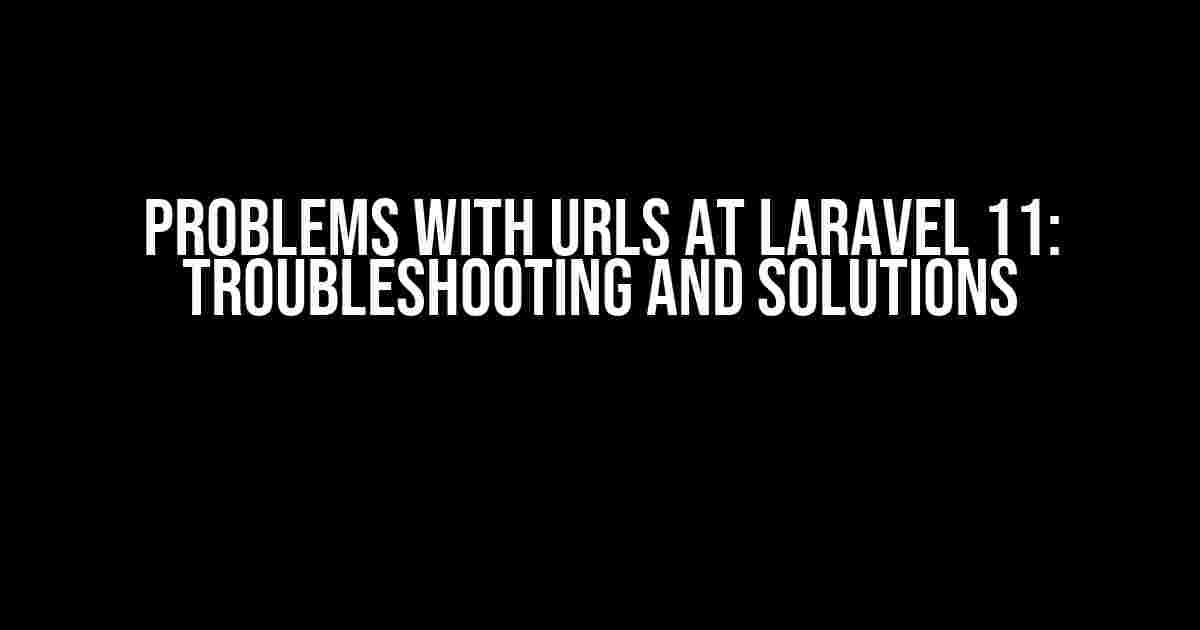Are you tired of dealing with pesky URL issues in Laravel 11? Well, you’re not alone! As a developer, you’ve probably encountered your fair share of URL-related problems that can drive you crazy. But fear not, dear reader, for we’re about to dive into the world of URL troubleshooting and explore the most common problems with URLs at Laravel 11, along with their solutions.
Problem 1: URL Parameters Not Working
One of the most frustrating issues you might face is when your URL parameters simply refuse to work as expected. You’ve set up your routes, defined your controllers, and yet, the parameters just aren’t being passed through.
// Example Route
Route::get('/users/{id}', 'UserController@show');
// Example Controller
public function show($id)
{
// This should display the user with the given ID, but it's not working!
return view('user.show', ['user' => User::find($id)]);
}To fix this issue, make sure you’ve enabled URL rewriting in your Apache server (if you’re using it). You can do this by adding the following code to your `.htaccess` file:
Options +FollowSymLinks
RewriteEngine On
RewriteCond %{REQUEST_FILENAME} !-d
RewriteCond %{REQUEST_FILENAME} !-f
RewriteRule ^ index.php [L]Alternatively, if you’re using Nginx, add the following configuration to your `server` block:
location / {
try_files $uri $uri/ /index.php?_share=++;
}Voilà! Your URL parameters should now be working as expected.
Problem 2: URL Generation Issues
Another common problem is when Laravel generates the wrong URLs for your routes. This can happen when you’re using named routes or route groups.
// Example Route
Route::name('users.show')->get('/users/{id}', 'UserController@show');
// Example Controller
public function show($id)
{
// Trying to generate the URL for the route, but it's not working!
$url = route('users.show', ['id' => 1]);
dd($url);
}To fix this issue, make sure you’re using the correct route name and parameters. You can also try using the `url()` helper function instead of the `route()` function:
$url = url(route('users.show', ['id' => 1]));Alternatively, you can use the `action()` helper function to generate the URL:
$url = action('UserController@show', ['id' => 1]);If you’re still having issues, double-check your route definitions and make sure you’re not accidentally overriding route names.
Problem 3: URL Encoding Issues
URL encoding can be a real pain, especially when working with special characters or non-ASCII characters. Laravel provides a few ways to handle URL encoding, but sometimes it can still go wrong.
// Example Route
Route::get('/search/{query}', 'SearchController@index');
// Example Controller
public function index($query)
{
// Trying to encode the query string, but it's not working!
$encodedQuery = urlencode($query);
dd($encodedQuery);
}To fix this issue, make sure you’re using the `urlencode()` function correctly. You can also use the `rawurlencode()` function, which is more suitable for encoding URL parameters:
$encodedQuery = rawurlencode($query);If you’re still having issues, try using the `Str::slug()` helper function to slugify your query string:
$slugifiedQuery = Str::slug($query);This will remove any special characters and convert the string to a URL-friendly format.
Problem 4: URL Localization Issues
When working with Laravel’s built-in localization features, you might encounter issues with URL generation. This can happen when you’re trying to generate URLs for localized routes.
// Example Route
Route::get('/{locale}/users', 'UserController@index');
// Example Controller
public function index($locale)
{
// Trying to generate the URL for the localized route, but it's not working!
$url = route('users.index', ['locale' => 'fr']);
dd($url);
}To fix this issue, make sure you’re using the correct locale parameter and route name. You can also try using the `url()` helper function with the `locale` parameter:
$url = url(route('users.index', ['locale' => 'fr']));Alternatively, you can use the `localized_url()` helper function, which is specifically designed for generating localized URLs:
$url = localized_url(route('users.index'), 'fr');If you’re still having issues, double-check your route definitions and make sure you’re not accidentally overriding route names or locale parameters.
Problem 5: URL Validation Issues
URL validation can be a real challenge, especially when working with complex URLs or user-inputted data. Laravel provides a few built-in validation rules, but sometimes it can still be tricky to get it right.
// Example Controller
public function store(Request $request)
{
// Trying to validate the URL, but it's not working!
$request->validate([
'url' => 'required|url',
]);
}To fix this issue, make sure you’re using the correct validation rules. You can also try using the `filter_var()` function to validate the URL:
$url = filter_var($request->input('url'), FILTER_VALIDATE_URL);
if (!$url) {
// URL is invalid, return an error message
return back()->withErrors(['url' => 'Invalid URL']);
}If you’re still having issues, try using a more specific validation rule, such as `url:regex`:
$request->validate([
'url' => 'required|url:regex',
]);This will validate the URL using a regular expression pattern.
Solution: URL Best Practices
To avoid common URL-related problems in Laravel 11, follow these best practices:
- Use clear and descriptive route names and parameters.
- Use the correct HTTP methods for each route (e.g., GET, POST, PUT, DELETE).
- Validate user-inputted data, including URLs.
- Use URL encoding and decoding functions correctly.
- Test your URLs thoroughly before deploying your application.
- Use the `url()` helper function or `route()` function to generate URLs.
- Avoid using hardcoded URLs in your application.
By following these best practices, you’ll be well on your way to URL nirvana!
Conclusion
In this article, we’ve explored the most common problems with URLs at Laravel 11 and provided solutions to fix them. We’ve also covered URL best practices to help you avoid common pitfalls and ensure your URLs are working correctly.
Remember, URLs are an essential part of any web application, and getting them right is crucial for a smooth user experience. By following the tips and tricks outlined in this article, you’ll be able to troubleshoot and fix URL-related issues with confidence.
Happy coding, and may your URLs be forever problem-free!
| Problem | Solution |
|---|---|
| URL Parameters Not Working | Enable URL rewriting, check .htaccess file, and use correct route definitions |
| URL Generation Issues | Use correct route name and parameters, try using url() or action() helper functions |
| URL Encoding Issues | Use urlencode() or rawurlencode() functions correctly, try using Str::slug() helper function |
| URL Localization Issues | Use correct locale parameter and route name, try using localized_url() helper function |
| URL Validation Issues | Use correct validation rules, try using filter_var() function or url:regex validation rule |
Now, go forth and conquer the world of URLs!
Here are 5 Questions and Answers about “Problems with URLs at Laravel 11” in a creative tone:
Frequently Asked Question
Stuck with Laravel 11 URL issues? Don’t worry, we’ve got you covered! Check out these frequently asked questions and get back to coding in no time!
Why are my URLs not working after upgrading to Laravel 11?
Ah, the classic “URL conundrum”! After upgrading to Laravel 11, you might need to update your `web.php` file to use the new `Route` syntax. Make sure to use the `Route::get()` method instead of `Route::get([‘as’ => ‘route.name’])`. This should fix the issue!
How do I fix the “Route [route.name] not defined” error in Laravel 11?
Oops, looks like you’ve got a route naming issue! Double-check that you’ve defined the route correctly in your `web.php` file. Make sure the route name matches the one you’re trying to use in your Blade template. Also, try running `php artisan route:clear` to clear the route cache. That should do the trick!
Why are my URL parameters not being passed correctly in Laravel 11?
Uh-oh, parameter pandemonium! In Laravel 11, you need to use the `Request` facade or the `request()` helper function to access URL parameters. For example, use `Request::input(‘param_name’)` or `request()->input(‘param_name’)` to get the parameter value. Easy peasy!
How do I generate a URL with a query string in Laravel 11?
Query string conundrum! In Laravel 11, you can use the `url()` helper function to generate a URL with a query string. For example, `url()->current() . ‘?param_name=value’` will give you the current URL with the specified query parameter. You can also use the `route()` function with an array of parameters!
Why are my URLs not being generated correctly when using a custom domain in Laravel 11?
Domain drama! When using a custom domain in Laravel 11, make sure you’ve set the `url` and `asset_url` values in your `config/app.php` file correctly. Also, ensure that your `nginx` or `apache` configuration is set up to handle the custom domain. Finally, try running `php artisan config:clear` to clear the config cache. That should fix the issue!



